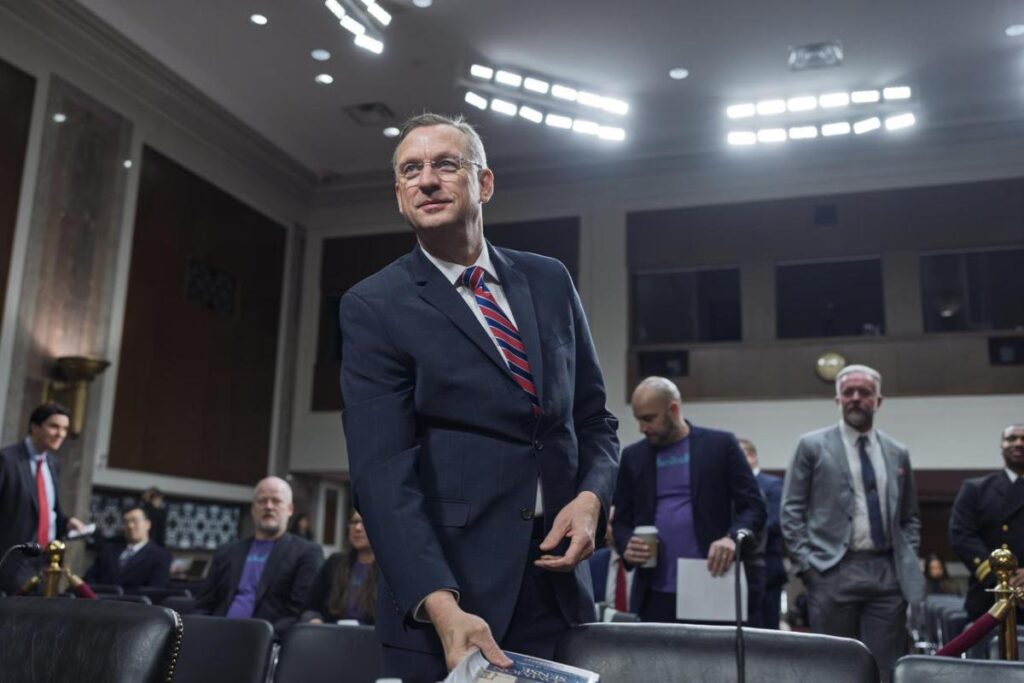The Department of Veterans Affairs fired 1,400 more employees Monday, bringing the total number of dismissals in the department to roughly 2,400 under the Trump administration’s effort to slash the size of the federal workforce.
The workers — more than 3.3% of the department’s probationary employees — were union members considered to have “non-mission critical” positions, according to a VA news release Monday evening. The move follows the firings of nearly 1,000 probationary employees Feb. 14, some of which were walked back later when they were determined to be essential employees.
The announcement drew sharp criticism from the Veterans of Foreign Wars, which issued the first major statement since the firings began from a national veterans service organization. The ongoing cuts may disproportionately affect vets, since they make up more than 28% of the VA workforce and account for the same share of the federal workforce.
Read Next: ‘People Are Very Scared’: Trump Administration Purge of JAG Officers Raises Legal, Ethical Fears
VFW National Commander Al Lipphardt said fired veterans weren’t “brand-new, off-the-street employees,” but were those who had served the country for decades in uniform and civil service.
“There are bigger ramifications in firing veterans than just faceless workers being let go. The American people are losing technical expertise, training and security clearances already bought and paid for by taxpayers,” Lipphardt said in a statement Monday night. “We’re losing people who are genuinely committed to the mission and find a continued sense of purpose in what they do.”
VA Secretary Doug Collins described the dismissals as “extraordinarily difficult” but said the savings in salaries and benefits — an estimated $83 million a year — would go toward serving veterans, families and survivors. In fiscal 2023, the VA’s budget was nearly $304 billion, including mandatory spending such as disability payments and pensions.
“These moves will not hurt VA health care, benefits or beneficiaries. In fact, veterans are going to notice a change for the better,” Collins reassured beneficiaries in a statement Monday.
The VA has almost 450,000 employees, nearly 92% of whom work in health care and health administration and support services. It has roughly 40,000 probationary employees, most of whom were exempt from being fired because they serve in mission-critical positions, according to the VA.
The Office of Personnel Management’s directive to dismiss personnel across government agencies who had not yet gained civil servant employment protections has affected nearly 6,000 veterans, according to a fact sheet issued Tuesday by House Democrats Rep. Rosa DeLauro of Connecticut, the Appropriations Committee ranking member, and Rep. Debbie Wasserman Schultz of Florida, ranking member of the subcommittee that funds the VA.
According to the lawmakers, 258 veterans were among the first 1,000 personnel fired by the VA, and more than 2,300 veterans are expected to lose their jobs this week at the Defense Department.
“This move should outrage anyone who respects our veterans and service members and believes our promises to them should be upheld. We have repeatedly asked the Trump administration for additional information on the exact number of veterans they have fired and what they plan to do to support them,” DeLauro said in a news release.
Republican lawmakers say they are watching the reductions closely. During a joint House and Senate Veterans Affairs committees hearing on veteran service organization priorities Tuesday, Chairman Sen. Jerry Moran of Kansas noted that the VA has established a process allowing for exemptions and he has asked the department for further details.
“VA must be forthcoming and transparent to Congress, to [veteran service organizations], to the public, to its workforce, regarding workforce strategy,” Moran said.
Rep. Mike Bost, R-Ill., a Marine Corps veteran who chairs the House Veterans Affairs Committee, said he believed Collins will “right-size and reorganize the VA.”
“I trust Secretary Collins doing the right thing for veteran taxpayers. One, because he is himself a veteran and two, because he knows the mission in serving veterans. As chairman and as a veteran myself, my mission is the same: Veterans — the people sitting in front of us right now — are my No. 1 priority, not protecting bureaucracy,” Bost said.
During the same hearing, however, Sen. Angus King, I-Maine, noted that employees who may be considered “nonessential” provide valuable service to veterans.
The debate over who is considered “non-mission critical” arose following the Feb. 14 firings, which included two employees at the Veterans Crisis Line, the hotline that provides support and services to suicidal veterans. In a statement issued Feb. 20 in response to media reports and Sen. Tammy Duckworth, D-Ill., who raised concerns about the potential harm to veterans, Collins noted that no Veterans Crisis Line responders were fired.
But the two who were fired were administrative staff and a supervisor — personnel deemed critical to crisis line operations by a VA Office of Inspector General report last year. They have since been reinstated.
“The person who answers the phone can be as important as the person who delivers the care,” King said. “If a veteran calls for a health care appointment and there’s no one there to answer the phone, that’s a denial of benefits, just as sure as if they can’t see the doctor.”
During the hearing, DAV Executive Director Randy Reese agreed.
“We view the series of actions from return to work, hiring freeze, delayed resignation, probationary employee terminations. All is just unprofessional. That’s not how you treat people. You don’t treat your own staff that way. These are not widgets. These are human beings,” he said.
Related: Elon Musk Aide Is Now Working at VA and Accessing Its Computer Systems
Read the full article here


